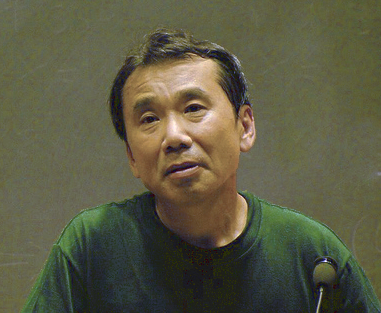One of my absolute favorite things to do on vacation is to sit down with a good book.
Not a business book, mind you. Fiction.

So I loaded up my Kindle and brought them to Hawaii with us…
Now here’s the thing — they weren’t all that great… Certainly not compared to the genius works he’s turned out since.
But… I could still feel the seed of today’s Murakami in those initial works… and I got something way more valuable than a good read. I got to read the story of the moment Marukami decided to write his first novel, the struggle he felt as he got started, and how he ultimately discovered his real “voice”.
It blew me away so much that I wanted to share it with you.
“One bright April afternoon in 1978, I attended a baseball game at Jingu Stadium, not far from where I lived and worked… At the time there were no bleacher seats there, just a grassy slope. The sky was a sparkling blue, the draft beer as cold as it could be, and the ball strikingly white against the green field, the first green I had seen in a long while…
In the bottom of the first inning, Hilton slammed Sotokoba’s first pitch into left field for a clean double. The satisfying crack when the bat met the ball resounded throughout Jingu Stadium. Scattered applause rose around me. In that instant, for no reason and based on no grounds whatsoever, it suddenly struck me: I think I can write a novel.
I can still recall the exact sensation. It felt as if something had come fluttering down from the sky, and I had caught it cleanly in my hands. I had no idea why it had chanced to fall into my grasp. I didn’t know then, and I don’t know now. Whatever the reason, it had taken place. It was like a revelation. Or maybe “epiphany” is a better word. All I can say is that my life was drastically and permanently altered in that instant—when Dave Hilton belted that beautiful, ringing double at Jingu Stadium.
After the game… I took the train to Shinjuku and brought a sheaf of writing paper and a fountain pen. Word processors and computers weren’t around back then, which meant we had to write everything by hand, one character at a time. The sensation of writing felt very fresh. I remember how thrilled I was. It had been such a long time since I had put fountain pen to paper.”
Now of course, making the choice to write a novel and buying the pen and paper was just the beginning, but the truth was that Murakami “hadn’t a clue about how to write a novel.” Just a feeling, an epiphany that he could.
He was a fan of Russian psychological realism and American hard-boiled detective novels, but hadn’t really read any Japanese novels and he hadn’t really written before. Nevertheless, he sat down to write. And soon found that he didn’t like what he wrote. It was boring. It left him cold.
So he thought to himself, “If that’s the way the author feels… a reader’s reaction will probably be even more negative. Looks like I just don’t have what it takes.”
“If that’s the way the author feels… a reader’s reaction will probably be even more negative. Looks like I just don’t have what it takes.”
Now Murakami could have stopped there, but he could still remember the sensation of his epiphany in Jingu Stadium and just knew he had to keep going.
So he pushed through the resistance and on the other side, a deeper truth appeared: “Give up trying to write something sophisticated… Forget all those prescriptive ideas about ‘the novel’ and ‘literature’ and set down your feelings and thoughts as they come to you, freely, in a way that you like.”
Easier said then done.
It’s one thing to talk about writing freely and another thing to actually do it. Especially if you’re a total beginner like he was at the time.
But here’s where it gets interesting. He realized he was trying to be too precious about the process with his stack of manuscript paper and his fountain pen. As long as he had that there, it was putting him in the mode of trying to write “literature”.
So he got out an old typewriter and decided to experiment with writing the opening of his novel. But not in Japanese.
This time in English.
Even though he wasn’t fluent in English. In fact, his vocabulary was limited. He didn’t really understand the grammar. So all he could do is write in short, simple sentences.
But instead of blunting his creativity, it forced him to simplify his ideas into their basic essence. All of the complex thoughts and ideas he had floating through his head when he tried to think and write in Japanese – ideas so complex he couldn’t even get them into writing.
It stripped all the “fat” from his language and descriptions. It got him down to simple; to what was really important about the story. At first, it felt rough and uncultivated.
But gradually, a distinct rhythm began to form.
He realized that he had been socialized his entire life to talk and write in a specific way and it was so hard for him to go beyond that socialization and tune into his unique voice.
Through writing in a foreign language he was able to remove the limitations of his upbringing and express his thoughts and feelings in a new way. He realized that he didn’t need to try to impress people with the big words or beautiful turns of phrases. And that lead him to his unique rhythmic style…
Once he found that he went back to his pen and paper and and translated that first chapter from English back into Japanese…
Through that process, a new form of Japanese writing emerged that would become his unique style moving forward.
The interesting thing about this story is that sometimes you have to unlearn everything you know in order to “tune in” to a deeper truth and expression.
No matter how talented you are, you can’t expect to write a brilliant novel right off the bat – especially if you’ve never written fiction before. There’s no way around it — you have to do a lot of bad writing before the good writing emerges.
The problem is that these days, most people have impossible expectations for themselves.
They don’t allow the time, space and experimentation it takes to create, arrive at, find, or “tune in” to your true voice and style…
And the beauty of finding that true voice and style is that it allows you to attract a global tribe that follows you not just because of what you do but because of who you are and how you’re different.
I want you to internalize this: No matter who you are or how big your list is, you have a tribe.
No matter who you are or how big your list is, you have a tribe.
Simply by being yourself, you attract the people who resonate with how you’re being, people who resonate with your values and beliefs…. By being you, you’ve attracted the friends you have, the people you’re sitting next to right now… and just about all the people in your life. Your tribe.
While most people are shooting for a clear target, it’s often the artists and entrepreneurs of the world that are shooting for a target that no one else can see…
And it’s one of my gifts and passions to help you make that target more visible to yourself and ultimately more visible to the world…
So you can see it and shoot for it… and build your tribe around it… it may still be a moving target, but when you can clearly see what you’re shooting for, you can create it… So the beauty of building an online business is that you get to find your tribe where they are — no matter where they live in the world.
It’s no longer like high school where you’re stuck with the people who just happened to share your zip code. Now the world is your tribe… or at least an amazing segment within it…
So while many people think that entrepreneurship is inherently a lonely journey.
I believe that when you tune into your message, leave behind the clichés of your industry behind, all of the stuff that’s been said a million times before by a million people, and start to put out content and material that’s authentically and unmistakably YOU, your tribe will materialize, just like magic.
You’ll automatically become the superhero to an amazing tribe — because you’ll be creating the relationships — whether they’re in person or virtual or more likely both — that you’ve always wanted in your life… the tribe you’ve always wanted to be a part of.
Not being afraid of your authentic voice guarantees that the journey will never be lonely, and that it will never be all up to you.
Love it? Hate it? Let me know...
-
I still remember what my English writing college teacher wrote on my paper: you can write well when you know what you are talking about
-
Very true indeed Elizabeth! I would also add that you can write well when you’re fully aligned with what you’re talking about and believe it!
-
-
When I started writing my first book it took me three months just to get going! When I stopped “thinking about it” and just started writing from my heart the words that came to me… everything just flowed effortlessly! I really enjoyed learning this and it has changed my life in many ways!
-
I feel much the same way Tara. The more I write, the more it flows… as what once felt hard, now feels natural and easy. I’m glad you found your flow…
-
-
Lovely post. SO what are the two secrets, exactly? Be authentic? If so, what specifically is the secret action to take? Your tribe shows up, how? I love the concepts you’re writing about but what are the actions? Specifically? Thank you!
-
“Being Authentic” is the end point, but I find that that’s a useless thing to say to somebody. 🙂
The 2 secrets are:
1. Find a way to “forget’ what you know (like Murakami did by writing in English first. Your way will be different.)
2. Be OK with sucking at first. (People these days aren’t OK with sucking, and tend to not give themselves the time & space to improve.)
-
-
What an ingenious post, Marisa! It’s if full of clarifications and subtle distinctions that tell me a lot about you. You said three of the most important things I’ve ever heard:
Firstly, “it’s often artists and entrepreneurs who are shooting for a target that no one else can see” – so true. And no one’s said it before in quite that way. For me, I can’t seem to articulate to others exactly what I want to create. I definitely know what it is, but it’s an intangible picture that lives in my head. I can’t verbally get it out.
Secondly, “it’s one of my gifts and passions to help you make that target more visible to yourself and ultimately more visible to the world.” Beautiful. Many people say something similar about themselves (although not in those words), but I actually believe you when you say it. You’re so clear about it – how can I not believe you?
Thirdly, I love that you said we should tune into our own message, leave the clichés behind, and stop saying all of the stuff that’s been said a million times before by a million different people. This is great. You know, oftentimes I clam up, I stay quiet, and I don’t offer my opinions and viewpoints for this very reason. I’m afraid of sounding like a cliché. I’m afraid of sounding like a million other people. So I just stay quiet instead. It’s easier.
Your message is truly inspiring to me. Enjoy Hawaii!
-
Thank you Nicole! So glad this post touched you and helped you understand the gap between what you can see in your head and how to share it with the rest of the world!
-
-
I love this:
“While most people are shooting for a clear target, it’s often the artists and entrepreneurs of the world that are shooting for a target that no one else can see…”
Everything good I’ve created came when I relaxed into myself, stopped looking at how other people were doing things, got clear inside, and just did my own thing.
When I tried following rules and how you are “supposed” to do something, I felt stifled, my efforts felt forced, and my results felt stale.
It seems like when we create from a centered and authentic place, creative efforts really do come out with ease and that little something special that reflects who we are and attracts others as well.
Very interesting read, Marisa!-
Absolutely! There is a part of you that already knows your voice and what you’re here to do and it’s all about tuning into that voice while learning the skills to express that in the world in a way that’s valuable to others.
-
-
Greetings Marisa & Tribe,
Your blog about Haruki Marukami was very inspiring and I thought I’d share something with you, even though it’s about a visual artist rather than a writer. As you wrote that Haruki Marukami found the ability to write simply and in his own voice by writing in English, rather than in Japanese, I recalled teaching a brain based workshop called “Unleashing Your Creativity” at Malibu Arts Retreat and how an internationally reknowned visual artist had had her creative abilities stifled after having suffered 3 strokes. After just hearing a 3 minute “intro” to my class on the 1st evening of the retreat, she had taken this information and experimented the next morning by using her Japanese paint brush, vertical to the paper, with the tips of her fingers and moving from right to left instead of left to right. She did come to my class and the following Christmas she sent me a card with a copy of her beautiful painting made at the retreat. Her words “The effort of remembering to go from right to left meant the shakes were conquered. The second I forgot and went from left to right the shaky brush was back. My companions welcomed me back as a painter. The shakes had kept me from painting for five years. I can’t thank you enough for sharing your knowledge with me. It was a joyous experience.”
From one short woman (4’10-3/4″ tall 😉 to another – thank you for sharing your wonderful wisdom with such clarity. I’m refocusing my work and your blog has helped me enormously. I wish you great success. Yours in Gratitude, WendyHT-
Beautiful! Congratulations on the powerful work you are doing Wendy!
-
-
I LOVE this!
“…when you tune into your message, leave behind the clichés of your industry behind, all of the stuff that’s been said a million times before by a million people, and start to put out content and material that’s authentically and unmistakably YOU…”
Oh. So. Exactly. YES! I am soooooo into leaving the cliches of my industry behind! (Of which there are many…) I’m all about this! And making my content more uniquely me! (I’ve been working on this for a couple of years, or trying to anyway, I hope laying the groundwork at least, and I am just itching to sharpen/tighten that up and drill it down as far as it can go and get it more OUT THERE….)



























Leave a Comment